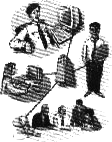网址:http://m.1010jiajiao.com/timu3_id_2404386[举报]
E-mail is one of the biggest threats(威胁)to your home computer. By understanding how E-mail works, and by taking some steps in how you deal with reading and writing messages, you can keep this threat out of your computer. When you exchange E-mail with someone else, the messages sent between you and that person pass through several computers before they reach their places. Imagine this conversation as it is taking place in an Internet“room”, a very, very big room. Anyone, or more exactly, any program can probably understand what is being said, because most Internet conversations are not hidden(隐藏)in any way. As a result, others may be listening in, capturing what you send, and using it for their own good.

E-mail-borne viruses(病毒)often arrive in attractive, fantastic appearances, much like the beautiful ads we receive by way of traditional mail that is made to sell us something. By beautiful appearances, an infected(感染)E-mail message seems to be something we want to read from someone we know, not a mean virus ready to destroy or damage our computers.
There are some steps that you can take to help you decide what to do with every E-mail message with an attachment(附件)that you receive. You should only read a message that passes all of these tests:
1)The Know Test: Is the E-mail from someone that you know?
2)The Received Test: Have you received E-mail from this sender before?
3)The Expect Test: Were you waiting for E-mail with an attachment from this sender?
4)The Meaning Test: Do the topic line of the E-mail massage and the name of the attachment both have meanings?
5)The Virus Test: Is the E-mail infected?
1. Which of the following is the main idea of the first paragraph?
A. We should not exchange our E-mail with someone else.
B. It is dangerous to read and write E-mail message sat home.
C. We should learn how E-mail works to take care of our computers.
D. Our chats on computers are usually going on in a big Internet room.
2. What does the underlined word“capturing”probably mean?
A. taking B. hiding C. receiving D. destroying
3. As the Internet is open to anyone, we should ___________.
A. not read and write messages in our home computers
B. not allow nice advertisements to reach our computers
C. stop our conversations while someone is listening in it
D. be careful with the attractive E-mails sent by strangers
4. What is the passage mainly talking about?
A. The threats of E-mail.
B. The safety of home computers.
C. The E-mail-borne viruses.
D. The steps to receive E-mail messages
查看习题详情和答案>>
| |||||||||||||||||||||||||||||||||||||||||||||||||||||||||||
The first room in Fumi’s house is a small entryway. People who enter the home remove their shoes. They put on different shoes with soft soles. That seemed odd ot Kara. She wears her street shoes in the house.
Kara likes the photo of Fumi and her family eating. They gather around a table, just like Kara and her family, Kara’s family sits on chairs, but Fumi’s family sits on cushions on a strau mat on the floor. The table is low to the ground. What seems to be a wall behind Fumi’s family is actually a door without knobs. Fumi explained that the door slides open. It is made from strong paper glued to thin strips of wood. “I could never play ball in that house!” thought Kara.
小题1: Why did the author write the passage?| A.to explain how to have an e-pal |
| B.to tell the history of e-mail |
| C.to compare homes in Japan and in Ameria |
| D.to show that homes in Arizona are better than homes in Japan |
小题2:What does Fumi usually do before getting into the house?| A.Take off the shoes. |
| B.Put on her street shoes |
| C.Wear her different shoes with high heels. |
| D.Have slippers on. |
小题3:How is Fumi different from Kara?| A.Fumi lives in the United States. |
| B.Fumi’s family sits on the floor to eat. |
| C.Fumi’s family eats around a table. |
| D.Fumi is in the third grade. |
小题4:What is the same about Fumi’s and Kara’s homes?| A.Families sit around a table to eat. |
| B.People wear soft-soled shoes inside. |
| C.The floors are covered with straw mats. |
| D.They are in the same country. |
小题5:Kara and Fumi both__________.| A.take their shoes on when they get home. |
| B.live in houses with doors made from paper |
| C.learn about a new place from their e-pal |
| D.sit on chairs during dinner |
—Dad, I can’t open my e-dictionary in my computer.
—You can _____ the computer and try again.
A. turn on B. restart C. start D. turn of
查看习题详情和答案>>
You are about to open the most important book--the book of your life.
Are we obsessed with(痴迷)holding many things when we are alive,such as money,power, and property?
(A)we pass all of our money, power and property to somebody else at last! What reminds? Not much!
What would you like to leave behind when you(B)pass away? Beautiful memories of happy time or pages that you wish to tear out forever? Today you have been given all opportunity to rewrite your book with a(c)fresh piece of paper.
If you knew you had only one more day to live,how would you use this valuable time,how would you write your own book? Would you be able to enjoy the golden rays(光线)of the(D)_______and the gentle breeze?
Take notes of all the good things(E)_________your life.Live each hour with happiness,love the people,and do all the things that(F)你以前从未做过.Offer a helping hand and live each day as if there was no tomorrow.
This is the book--- the book of your life.
1.将划线部分(A)改写为All of our money,1powerand property ______ _______to somebody else at last!
2.写出划线部分(B)和(C)的同义词或近义词
3.在将划线部分(D)和(E)的空白处各填入一个适当的单词
4.将划线部分(F)译成英语
5.本文用一个词语来比喻人生。请在文章中找到这个词语。
查看习题详情和答案>>